This article was medically reviewed by Alina Lane, DDS. Dr. Alina Lane is a Dentist who runs All Smiles Dentistry, a general practice dental office based in New York City. After completing a DDS at the University of Maryland, Dr. Lane completed a year-long clerkship in Implantology at the University of Maryland, where she focused on the advanced restoration of dental implants. She continued her advanced education by completing a General Practice Residency at Woodhull Medical Center, an affiliate of the NYU School of Medicine. She received the Woodhull Medical Center Resident of the Year 2012-2013.
There are 8 references cited in this article, which can be found at the bottom of the page.
This article has been viewed 46,999 times.
There are lots of ways you can help reduce swelling after having your wisdom teeth taken out, and most of them involve things you likely have at home. Take pain medication, hold ice on your face, or do salt water rinses to make the swelling go down and feel less pain. You can also help prevent additional swelling by doing things like elevating your head and not using straws in your drinks. After about three days, the swelling should go down as your mouth heals.
Steps
Treating Wisdom Tooth Swelling
-
1Take NSAID pain medication that targets swelling. Your oral surgeon likely prescribed you pain killers to take after your wisdom teeth surgery, so follow the dosage instructions on the label to take these safely and correctly. If you don’t want to take those, ibuprofen or naproxen is one of the best pain relievers for wisdom teeth recovery that also helps with swelling.[1]
- Remember to take the medication that prevents infections that your oral surgeon gives you as well as the one targeting pain, reading the instructions on each bottle carefully to be sure you're taking them as often as is necessary.
- Opiate pain medication doesn’t decrease inflammation as effectively as NSAIDs.
- The side effects of the medication will depend on the exact type of medicine prescribed to you, but normal side effects often include an upset stomach, dizziness, or decreased appetite.
-
2Use ice to reduce swelling for the first 36 hours after your surgery. Hold an ice pack on the area near where your wisdom teeth were, or wrap ice in a soft cloth and hold them to your face. Leave the ice on for 20 minutes, and then remove it for 20 minutes, switching back and forth as much as is necessary for the first 36 hours.[2]
- Ice won’t have as beneficial of an effect after 36 hours.
- Taking the ice compress off after 20 minutes is important to improve circulation and ensure the swelling goes down.
Advertisement -
3Rinse your mouth with saltwater or mouthwash to help clean it.[3] Only do this after the first 24 hours after your surgery has passed. Add 1 tsp (4.9 ml) of salt to a cup of lukewarm water and swish it around gently in your mouth to help with swelling, or use an antiseptic mouthwash to help clean the area around your wisdom teeth.[4]
- Avoid rinsing your mouth vigorously with the saltwater or mouthwash.
-
4Place chamomile tea bags in your mouth to help soothe it. Place a chamomile tea bag in a cup of hot water to activate the tea. Once the tea bag has cooled down, place it where your wisdom teeth were and bite down gently. Leave the tea bag in your mouth for up to 15 minutes before throwing it away.[5]
- The chamomile will help reduce inflammation and swelling.
-
5Dab clove oil on the wisdom teeth area to help treat pain and swelling. Dip a cotton ball in clove oil and gently dab the area that’s causing swelling. The clove oil will help with swelling while also reducing bacteria. Throw the cotton ball away once it’s been used.[6]
- Look for clove oil at your local big box store or online.
Preventing Swelling Before It Happens
-
1Keep your head elevated, even when you’re lying down. If you do lay down, rest your head on pillows so that your head is above your feet. Keep your upper body to be at a 45-degree angle. This helps reduce swelling and puts less pressure on your mouth.[7]
- Stack pillows on top of one another when you go to sleep, or rest using a neck pillow for easy lounging.
-
2Avoid strenuous activities or exercise while your mouth is healing. Exercising or moving around a lot can cause even more swelling. The first few days after your surgery, take it easy and try to rest as much as possible. Skip the gym and avoid doing unnecessary activities that require lots of energy or movement.[8]
- Spend time reading, watching television, or napping after having your surgery.
-
3Eat soft food and liquids to make mealtime easier. After your surgery, stick to soft foods such as soups, mashed potatoes, and puddings.[9] Avoid eating hard or sticky foods, as this could cause pain or get stuck in the area where your wisdom teeth were.[10]
- Other soft foods include Jell-O, smoothies, applesauce, yogurt, ice cream, or scrambled eggs.
-
4Drink lots of water to keep your body hydrated. Drinking fluids will help your body recover faster while also gently cleaning away any food that’s left in your mouth after you eat. Drink water, juice, milk, or drinks with electrolytes in them.[11]
- It’s best to avoid carbonated beverages for a few days after your surgery.
- Avoid alcohol and straws while you're healing.
-
5Stay away from straws to avoid damaging the wisdom teeth area. Sucking on straws can prevent the blood clot from healing properly and puts too much pressure on your healing mouth. Instead of using straws, sip from drinks normally until your mouth is healed.[12]
- Using straws can delay the healing process and increase pain and swelling.
Expert Q&A
-
QuestionHow do I prevent bleeding and infection in my mouth?
 Alina Lane, DDSDr. Alina Lane is a Dentist who runs All Smiles Dentistry, a general practice dental office based in New York City. After completing a DDS at the University of Maryland, Dr. Lane completed a year-long clerkship in Implantology at the University of Maryland, where she focused on the advanced restoration of dental implants. She continued her advanced education by completing a General Practice Residency at Woodhull Medical Center, an affiliate of the NYU School of Medicine. She received the Woodhull Medical Center Resident of the Year 2012-2013.
Alina Lane, DDSDr. Alina Lane is a Dentist who runs All Smiles Dentistry, a general practice dental office based in New York City. After completing a DDS at the University of Maryland, Dr. Lane completed a year-long clerkship in Implantology at the University of Maryland, where she focused on the advanced restoration of dental implants. She continued her advanced education by completing a General Practice Residency at Woodhull Medical Center, an affiliate of the NYU School of Medicine. She received the Woodhull Medical Center Resident of the Year 2012-2013.
Board Certified Dentist Don’t touch the wounded area or vigorously swish liquids in your mouth. This can cause the blood clot that formed in your mouth to dislodge, which can cause you to bleed or get an infection.
Don’t touch the wounded area or vigorously swish liquids in your mouth. This can cause the blood clot that formed in your mouth to dislodge, which can cause you to bleed or get an infection.
References
- ↑ https://www.nhs.uk/conditions/wisdom-tooth-removal/recovery/
- ↑ https://askthedentist.com/faster-wisdom-tooth-surgery-recovery/
- ↑ Alina Lane, DDS. Board Certified Dentist. Expert Interview. 21 April 2020.
- ↑ https://www.nhs.uk/conditions/wisdom-tooth-removal/recovery/
- ↑ https://yourdentalhealthresource.com/how-to-decrease-swelling-after-wisdom-tooth-removal/
- ↑ https://stlukesoralfacialsurgeons.com/the-5-best-remedies-to-relieve-wisdom-teeth-swelling-and-pain/
- ↑ https://askthedentist.com/faster-wisdom-tooth-surgery-recovery/
- ↑ https://www.nhs.uk/conditions/wisdom-tooth-removal/recovery/
- ↑ Alina Lane, DDS. Board Certified Dentist. Expert Interview. 21 April 2020.
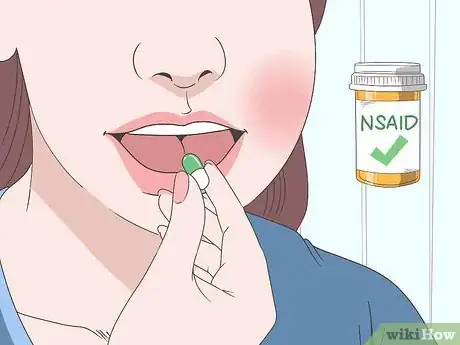
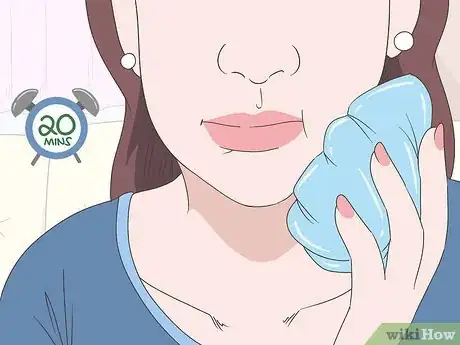


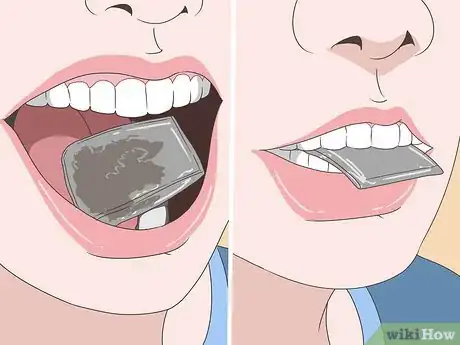
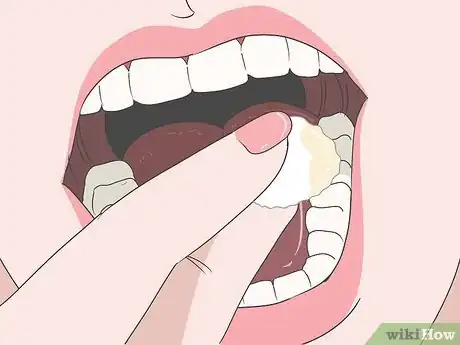


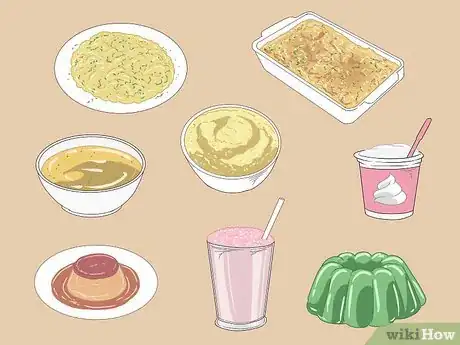






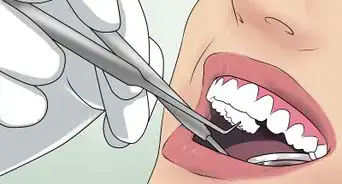
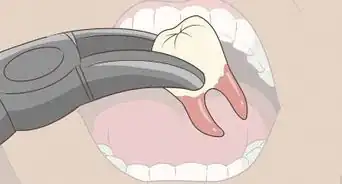



















































Medical Disclaimer
The content of this article is not intended to be a substitute for professional medical advice, examination, diagnosis, or treatment. You should always contact your doctor or other qualified healthcare professional before starting, changing, or stopping any kind of health treatment.
Read More...